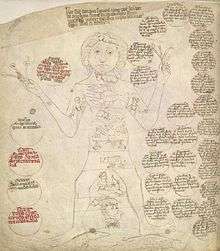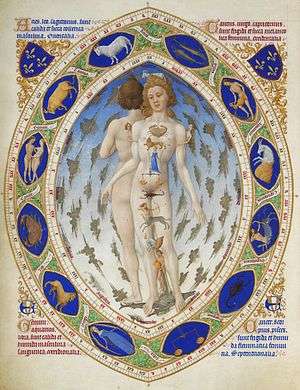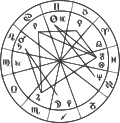Medical astrology
Medical astrology (traditionally known as iatromathematics) is an ancient applied branch of astrology based mostly on melothesia (Gr. μελοθεσία),[1] the association of various parts of the body, diseases, and drugs with the nature of the sun, moon, planets, and the twelve astrological signs.[2] The underlying basis for medical astrology, astrology itself, is considered to be a pseudoscience as there is no scientific basis for its core beliefs. [3][4][5][6][7][8][9]


Medical astrology and the Zodiac Man diagram associates each sign of the zodiac with parts of the body, from head (Aries) to toes (Pisces). The Zodiac Man illustrates centuries of connections between astrology and human personality, health, sickness, and medical treatments. These associations and the impact of the heavens on the health of humans were believed by both educated elite and average people for centuries.
Medical treatments were related to the zodiac in multiple ways. First, one must consider the patient’s personality and constitution that were determined by the zodiac sign of one’s birthday. Second, the affected part of the body and its sign must be considered. Third, the time of year or season when the patient became sick and its zodiac characteristics had to be assessed. Fourth, decisions about the best day for bleeding, purging, bathing, sweating, or other treatments were made based on the locations and phase of the moon in the zodiac. Finally, herbs and other medicines had to be selected for treatments while considering their associated astrological qualities. Specialized publications advised readers about the best time of year based on the astrological calendar to gather medicinal plants so they would be the most beneficial.[10]

While astrological decision-making was often do-it-yourself, astrological specialists could also be consulted. After examining an individual's natal chart, a medical astrologer may give advice to the client about the areas of the body in which they are most likely to experience trouble.
Historical references
Medical astrology was mentioned by Marcus Manilius (1st century AD) in his epic poem (8000 verses) Astronomica.
Publications
- Cornell, H.L., M.D., The Encyclopaedia of Medical Astrology (1933), Astrology Classics [Abington, MD, 2010.]
- Culpepper, Nicholas, Astrological Judgement of Diseases from the Decumbiture of the Sick (1655) ISBN 1-5381-0113-0
- Ficino, Marsilio, Three Books on Life (1489) [De vita libri tre] translated by Carol V. Kaske and John R. Clark, Center for Medieval and Early Renaissance Studies, State University of New York at Binghamton and The Reaissance Society of America (1989.) ISBN 0-86698-041-5
- Gailing, Stephanie, Planetary Apothecary, ISBN 978-1-58091-191-7
- Heindel, Max & Heindel, Augusta Foss, The Message of the Stars (Part II: Medical Astrology), ISBN 0-911274-18-9
- Heindel, Max & Heindel, Augusta Foss, Astro-Diagnosis – A Guide to Healing, ISBN 0-911274-06-5
- Nauman, Eileen, Medical Astrology, ISBN 0-9634662-2-4
- Ridder-Patrick, Jane, A Handbook of Medical Astrology, ISBN 978-0-9551989-0-8
- Saunders, Richard, The Astrological Judgment and Practice of Physick (1677) ISBN 1-161-41322-7
- Lilly, William, Christian Astrology (1647)
See also
- Planets in astrology
- Medieval medicine
- Astrological botany
- Spiritual healing
- Astrology and science
References
- See the definition of the Greek term in the LSJ.
- "Activities With Astrology". Astronomical society of the Pacific.
- "Objections to Astrology: A Statement by 186 Leading Scientists". The Humanist, September/October 1975. Archived from the original on 2009-03-18.
- Robert Hand. "The History of Astrology – Another View". Retrieved 2007-06-19.
- Eysenck, H.J., Nias, D.K.B., Astrology: Science or Superstition? (Penguin Books, 1982)
- Richard Dawkins (1995-12-31). "The Real Romance in the Stars". The Independent, December 1995.
- "British Physicist Debunks Astrology in Indian Lecture". Associated Press.
- "Astronomical Pseudo-Science: A Skeptic's Resource List". Astronomical Society of the Pacific.
- Paul R. Thagard, 'Why Astrology is a Pseudoscience', PSA, vol 1. University of Chicago Press, 1978.
- Resor, C. W. (June 3, 2020). "The Zodiac Man: How Astrology Guided Health Care". Primary Source Bazaar.
